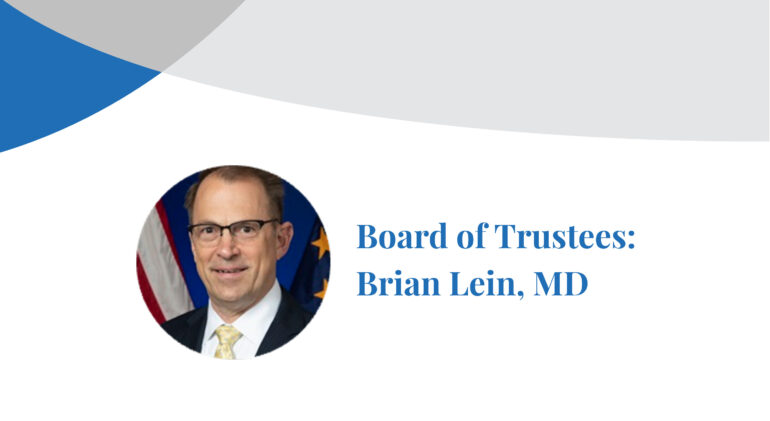Most children are enamored with superheroes, movie stars, and professional athletes. But not Brian Lein, MD. If you ask him who his childhood hero was, he’ll tell you it was his pediatrician.
“My older brother was born with a cleft lip and a cleft palate,” Dr. Lein recalls, “and my younger brother was born three-and-a-half months premature, which was a big deal in 1964 because they didn’t have neonatal intensive care units back then. We spent a lot of time at the pediatrician’s office.”
The doctor had a profound effect on young Brian. “His name was Dr. Bob West,” Dr. Lein says. “I still remember what he looked like and what he sounded like. He had such compassion for my mom and dad. Because of the care he provided, I wanted to be just like him. So from the time I was 7 years old, I knew I wanted to be a doctor.”
What Dr. Lein never expected to be was a military doctor, but that’s exactly what he became.
“I knew nothing about the military,” continues Dr. Lein, who grew up in New York near the United States Military Academy at West Point. “I ran track all my life, and West Point was one of two places that had an indoor track for winter. We were up there running track and field one time and the track coach said to me, ‘Would you be interested in coming to West Point?’ I told him I wasn’t sure I wanted to go there because I wanted to be a doctor, and he said, ‘Oh, we have doctors that graduate from West Point.’ And that’s how I ended up in the Army.”
After graduating from West Point, Dr. Lein went to medical school, then completed his residency in general surgery. At that point, he was planning his exit from the military. But then something life-changing happened: On Oct. 3, 1993, rebels shot down two Black Hawk helicopters that were part of a United Nations peacekeeping mission in Somalia. The ensuing Battle of Mogadishu, also known as the Black Hawk Down incident, killed 18 American soldiers and wounded 73 others.
Dr. Lein was stationed in Germany, where he was part of the medical team that cared for the wounded service members.
“Taking care of those young men was probably the most significant event of my military life,” says Dr. Lein, who decided to stay in the Army, in which he served 30 years as a physician and leader, retiring as a major general and chief of the Army Medical Corps.
Now assistant director of health care administration at the Defense Health Agency (DHA), Dr. Lein wants to share what he’s learned about medicine in the military with those outside it. It’s what led him to join The Chicago School’s Board of Trustees in 2023.
Dr. Lein was drawn to The Chicago School because of its focus on mental health and diversity. “I believe in what The Chicago School is doing,” Dr. Lein says. “There’s a massive gap in the diversity of mental health providers. By offering scholarships and setting up schools in areas that need them, The Chicago School is opening doors for a very diverse demographic to get into behavioral health care.”
From increased diversity comes increased representation, which is an essential salve for inherent bias in medicine, according to Dr. Lein.
“This is something we see a lot in the military: If you’re wearing a uniform and you’re sitting across from a provider who isn’t, there’s an automatic distrust. You assume that person can’t help you because they haven’t been through the things you’ve been through,” he says. “It’s the same in a lot of racial and ethnic communities. When you speak the same language, have the same values, and were raised the same way, your ability to connect and influence the social determinants of health and well-being is huge.”
Dr. Lein believes his expertise will be particularly useful as The Chicago School pursues plans to establish an osteopathic medical school, the proposed Illinois College of Osteopathic Medicine at The Chicago School.
“I really applaud the osteopathic profession because they’re focused on holistic wellness, which is something I’d like to support while I’m on the Board,” he says. “Medicine isn’t just about pieces and parts. The person sitting across from you is a human, and they’re coming to you because they’re sick or scared. You can’t just treat the disease; you have to take care of the person.”

